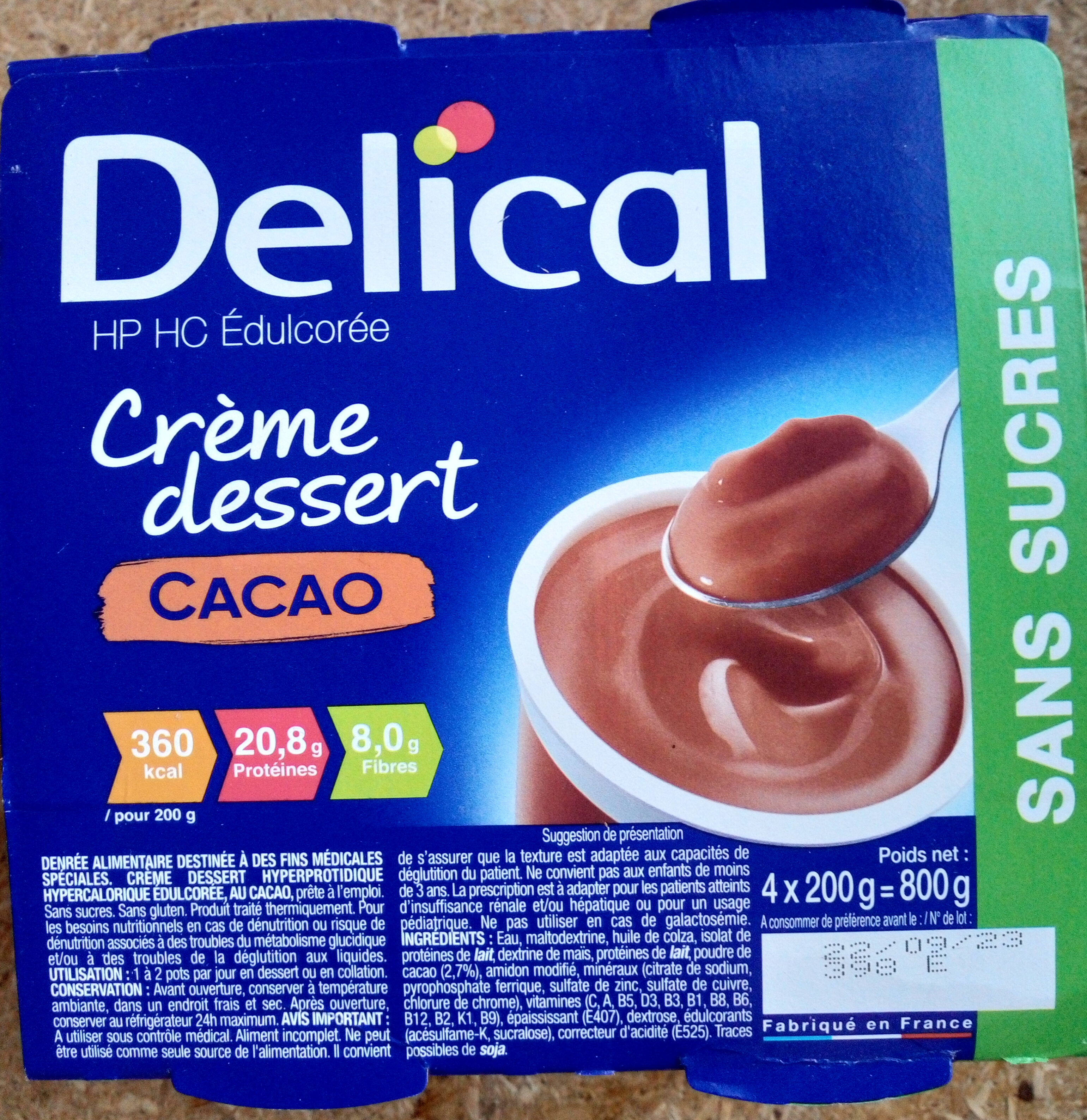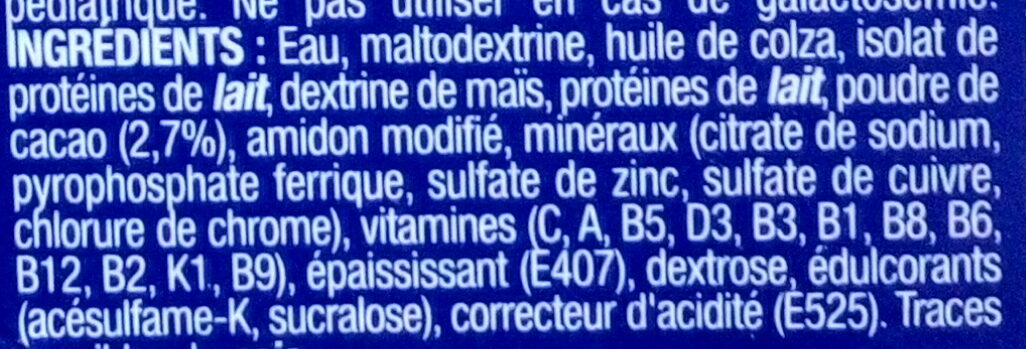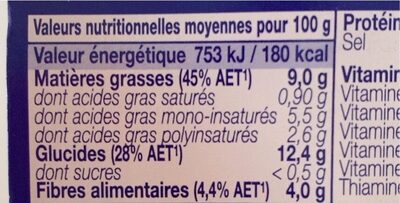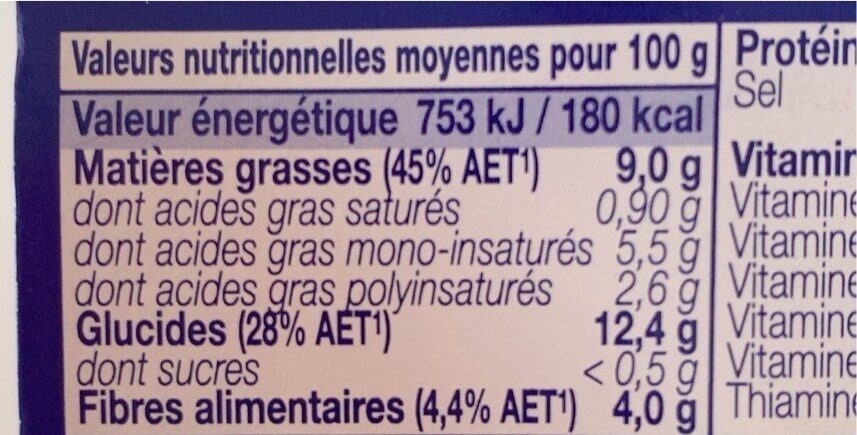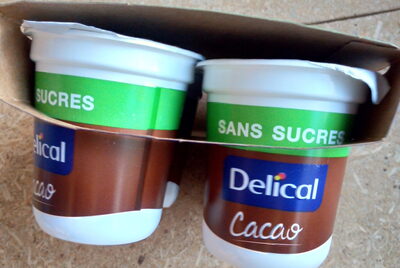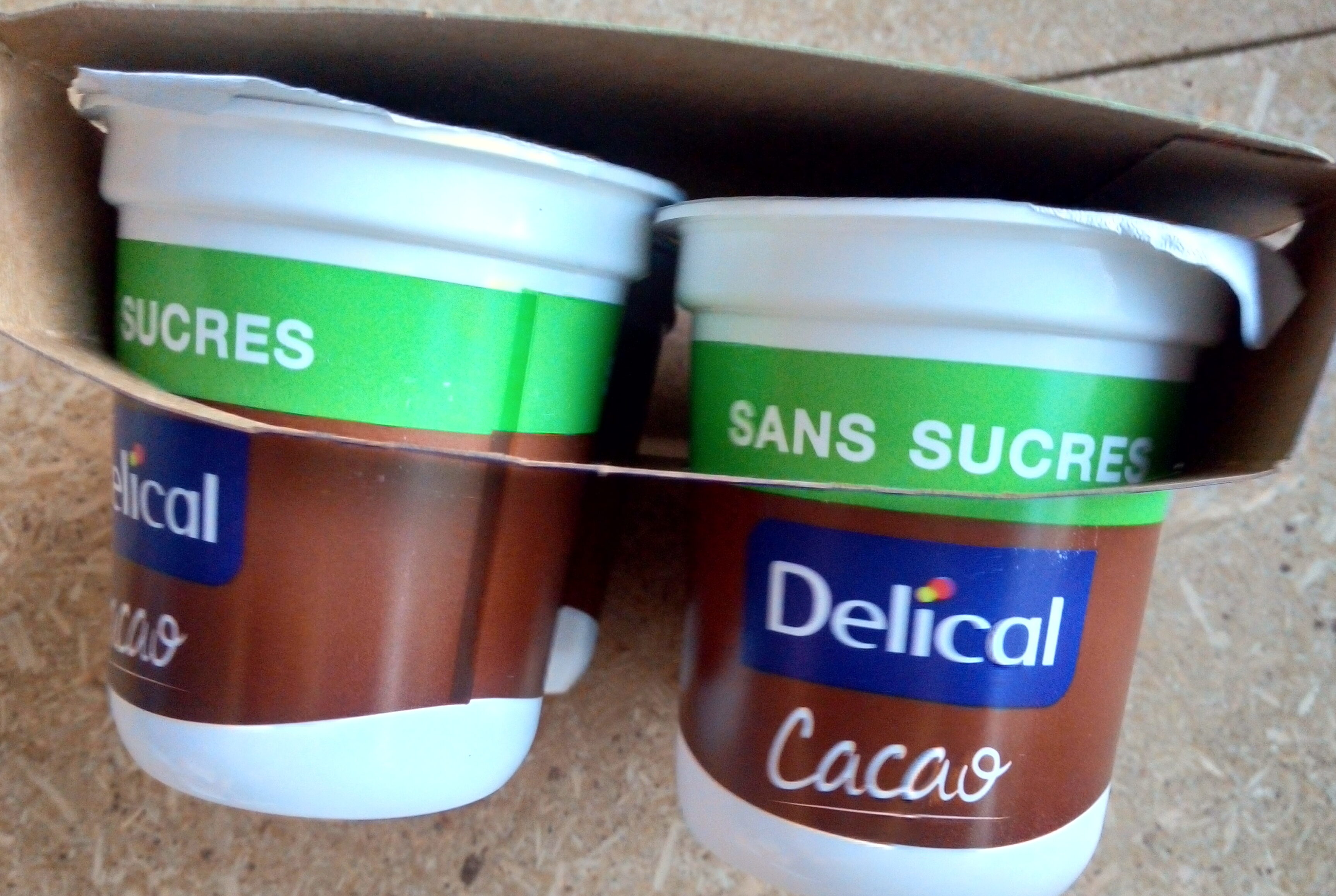Help us make food transparency the norm!
As a non-profit organization, we depend on your donations to continue informing consumers around the world about what they eat.
The food revolution starts with you!
DELICAL - 800 g (4 x 200 g)
DELICAL - 800 g (4 x 200 g)
Barcode: 3551101423382 (EAN / EAN-13)
Common name: crème dessert hyperprotidique hypercalorique édulcorée, au cacao
Quantity: 800 g (4 x 200 g)
Packaging: Plastic, Metal, Pot, Cardboard, Dry, Seal, Sleeve
Brands: Delical
Categories: Dairies, Desserts, Dairy desserts, Chocolate desserts, Creamy puddings, Dietary supplements, Chocolate creamy puddings, Refrigerated creamy puddings, Refrigerated chocolate creamy puddings
Labels, certifications, awards: No gluten, Source of fibre, Source of proteins, Enriched with calcium, High fibres, High proteins, Made in France, No added sugar, Rich in vitamin D, With sweeteners
Origin of ingredients: Unspecified
Manufacturing or processing places: France
Link to the product page on the official site of the producer: https://www.pharma-gdd.com/fr/delical-cr...
Stores: Pharmacie
Countries where sold: France
Matching with your preferences
Health
Ingredients
-
35 ingredients
: Eau, maltodextrine, huile de colza, isolat de protéines de lait, dextrine de maïs, protéines de lait, poudre de cacao (2,7%), amidon modifié, minéraux (citrate de sodium, pyrophosphate ferrique, sulfate de zinc, sulfate de cuivre, chlorure de chrome), vitamines (C, A, B5, D3, B3, B1, B8, B6, B12, B2, K1, B9), épaississant (E407), dextrose, édulcorants (acésulfame-K, sucralose), correcteur d'acidité (E525).Allergens: MilkTraces: Soybeans
Food processing
-
Ultra processed foods
Elements that indicate the product is in the 4 - Ultra processed food and drink products group:
- Additive: E1400 - Dextrin
- Additive: E14XX - Modified Starch
- Additive: E407 - Carrageenan
- Additive: E950 - Acesulfame k
- Additive: E955 - Sucralose
- Ingredient: Dextrose
- Ingredient: Glucose
- Ingredient: Maltodextrin
- Ingredient: Milk proteins
- Ingredient: Sweetener
- Ingredient: Thickener
Food products are classified into 4 groups according to their degree of processing:
- Unprocessed or minimally processed foods
- Processed culinary ingredients
- Processed foods
- Ultra processed foods
The determination of the group is based on the category of the product and on the ingredients it contains.
Additives
-
E1400 - Dextrin
Dextrin: Dextrins are a group of low-molecular-weight carbohydrates produced by the hydrolysis of starch or glycogen. Dextrins are mixtures of polymers of D-glucose units linked by α--1→4- or α--1→6- glycosidic bonds. Dextrins can be produced from starch using enzymes like amylases, as during digestion in the human body and during malting and mashing, or by applying dry heat under acidic conditions -pyrolysis or roasting-. The latter process is used industrially, and also occurs on the surface of bread during the baking process, contributing to flavor, color and crispness. Dextrins produced by heat are also known as pyrodextrins. The starch hydrolyses during roasting under acidic conditions, and short-chained starch parts partially rebranch with α--1‚6- bonds to the degraded starch molecule. See also Maillard Reaction. Dextrins are white, yellow, or brown powders that are partially or fully water-soluble, yielding optically active solutions of low viscosity. Most of them can be detected with iodine solution, giving a red coloration; one distinguishes erythrodextrin -dextrin that colours red- and achrodextrin -giving no colour-. White and yellow dextrins from starch roasted with little or no acid are called British gum.Source: Wikipedia
-
E407 - Carrageenan
Carrageenan (E407), derived from red seaweed, is widely employed in the food industry as a gelling, thickening, and stabilizing agent, notably in dairy and meat products.
It can exist in various forms, each imparting distinct textural properties to food.
However, its degraded form, often referred to as poligeenan, has raised health concerns due to its potential inflammatory effects and its classification as a possible human carcinogen (Group 2B) by the International Agency for Research on Cancer (IARC).
Nevertheless, food-grade carrageenan has been deemed safe by various regulatory bodies when consumed in amounts typically found in food.
-
E525 - Potassium hydroxide
Potassium hydroxide: Potassium hydroxide is an inorganic compound with the formula KOH, and is commonly called caustic potash. Along with sodium hydroxide -NaOH-, this colorless solid is a prototypical strong base. It has many industrial and niche applications, most of which exploit its corrosive nature and its reactivity toward acids. An estimated 700‚000 to 800‚000 tonnes were produced in 2005. About 100 times more NaOH than KOH is produced annually. KOH is noteworthy as the precursor to most soft and liquid soaps, as well as numerous potassium-containing chemicals.Source: Wikipedia
-
E950 - Acesulfame k
Acesulfame potassium: Acesulfame potassium - AY-see-SUL-faym-, also known as acesulfame K -K is the symbol for potassium- or Ace K, is a calorie-free sugar substitute -artificial sweetener- often marketed under the trade names Sunett and Sweet One. In the European Union, it is known under the E number -additive code- E950. It was discovered accidentally in 1967 by German chemist Karl Clauss at Hoechst AG -now Nutrinova-. In chemical structure, acesulfame potassium is the potassium salt of 6-methyl-1‚2,3-oxathiazine-4-3H--one 2‚2-dioxide. It is a white crystalline powder with molecular formula C4H4KNO4S and a molecular weight of 201.24 g/mol.Source: Wikipedia
-
E955 - Sucralose
Sucralose: Sucralose is an artificial sweetener and sugar substitute. The majority of ingested sucralose is not broken down by the body, so it is noncaloric. In the European Union, it is also known under the E number E955. It is produced by chlorination of sucrose. Sucralose is about 320 to 1‚000 times sweeter than sucrose, three times as sweet as both aspartame and acesulfame potassium, and twice as sweet as sodium saccharin. Evidence of benefit is lacking for long-term weight loss with some data supporting weight gain and heart disease risks.It is stable under heat and over a broad range of pH conditions. Therefore, it can be used in baking or in products that require a long shelf life. The commercial success of sucralose-based products stems from its favorable comparison to other low-calorie sweeteners in terms of taste, stability, and safety. Common brand names of sucralose-based sweeteners are Splenda, Zerocal, Sukrana, SucraPlus, Candys, Cukren, and Nevella. Canderel Yellow also contains sucralose, but the original Canderel and Green Canderel do not.Source: Wikipedia
Ingredients analysis
-
Palm oil free
No ingredients containing palm oil detected
-
Non-vegan
Non-vegan ingredients: Milk protein isolate, Milk proteins
-
Vegetarian status unknown
Unrecognized ingredients: Sodium citrate, Ferric diphosphate, Zinc sulfate, Chromium chloride, Thiamin, Vitamin b12, Folic acid
-
Details of the analysis of the ingredients
: Eau, maltodextrine, huile de colza, isolat de protéines de _lait_, dextrine de maïs, protéines de _lait_, poudre de cacao 2.7%, amidon modifié, minéraux (citrate de sodium, pyrophosphate ferrique, sulfate de zinc, sulfate de cuivre, chlorure de chrome), vitamines, vitamine C, vitamine A, vitamine B5, vitamine D3, vitamine B3, vitamine B1, vitamine B8, vitamine B6, vitamine B12, vitamine B2, vitamine K1, vitamine B9, épaississant (e407), dextrose, édulcorants (acésulfame-K, sucralose), correcteur d'acidité (e525)- Eau -> en:water - vegan: yes - vegetarian: yes - ciqual_food_code: 18066 - percent_min: 3.84615384615385 - percent_max: 83.8
- maltodextrine -> en:maltodextrin - vegan: yes - vegetarian: yes - percent_min: 2.7 - percent_max: 43.25
- huile de colza -> en:colza-oil - vegan: yes - vegetarian: yes - from_palm_oil: no - ciqual_food_code: 17130 - percent_min: 2.7 - percent_max: 29.7333333333333
- isolat de protéines de _lait_ -> en:milk-protein-isolate - vegan: no - vegetarian: yes - percent_min: 2.7 - percent_max: 22.975
- dextrine de maïs -> en:corn-dextrin - vegan: yes - vegetarian: yes - percent_min: 2.7 - percent_max: 18.92
- protéines de _lait_ -> en:milk-proteins - vegan: no - vegetarian: yes - percent_min: 2.7 - percent_max: 16.2166666666667
- poudre de cacao -> en:cocoa-powder - vegan: yes - vegetarian: yes - ciqual_food_code: 18100 - percent_min: 2.7 - percent: 2.7 - percent_max: 2.7
- amidon modifié -> en:modified-starch - vegan: yes - vegetarian: yes - ciqual_proxy_food_code: 9510 - percent_min: 0 - percent_max: 2.7
- minéraux -> en:minerals - percent_min: 0 - percent_max: 2.7
- citrate de sodium -> en:sodium-citrate - percent_min: 0 - percent_max: 2.7
- pyrophosphate ferrique -> en:ferric-diphosphate - percent_min: 0 - percent_max: 1.35
- sulfate de zinc -> en:zinc-sulfate - percent_min: 0 - percent_max: 0.9
- sulfate de cuivre -> en:e519 - vegan: yes - vegetarian: yes - percent_min: 0 - percent_max: 0.675
- chlorure de chrome -> en:chromium-chloride - percent_min: 0 - percent_max: 0.54
- vitamines -> en:vitamins - vegan: yes - vegetarian: yes - percent_min: 0 - percent_max: 2.7
- vitamine C -> en:e300 - vegan: yes - vegetarian: yes - percent_min: 0 - percent_max: 2.7
- vitamine A -> en:vitamin-a - vegan: yes - vegetarian: yes - percent_min: 0 - percent_max: 2.7
- vitamine B5 -> en:pantothenic-acid - vegan: yes - vegetarian: yes - percent_min: 0 - percent_max: 2.7
- vitamine D3 -> en:cholecalciferol - vegan: maybe - vegetarian: maybe - percent_min: 0 - percent_max: 2.7
- vitamine B3 -> en:e375 - vegan: maybe - vegetarian: maybe - percent_min: 0 - percent_max: 2.7
- vitamine B1 -> en:thiamin - percent_min: 0 - percent_max: 2.7
- vitamine B8 -> en:vitamin-b8 - vegan: yes - vegetarian: yes - percent_min: 0 - percent_max: 2.7
- vitamine B6 -> en:vitamin-b6 - vegan: yes - vegetarian: yes - percent_min: 0 - percent_max: 2.7
- vitamine B12 -> en:vitamin-b12 - percent_min: 0 - percent_max: 2.7
- vitamine B2 -> en:e101 - vegan: maybe - vegetarian: yes - percent_min: 0 - percent_max: 2.7
- vitamine K1 -> en:phylloquinone - vegan: yes - vegetarian: yes - percent_min: 0 - percent_max: 2.7
- vitamine B9 -> en:folic-acid - percent_min: 0 - percent_max: 2.7
- épaississant -> en:thickener - percent_min: 0 - percent_max: 2.7
- e407 -> en:e407 - vegan: yes - vegetarian: yes - percent_min: 0 - percent_max: 2.7
- dextrose -> en:dextrose - vegan: yes - vegetarian: yes - ciqual_proxy_food_code: 31016 - percent_min: 0 - percent_max: 2.7
- édulcorants -> en:sweetener - percent_min: 0 - percent_max: 2.7
- acésulfame-K -> en:e950 - vegan: yes - vegetarian: yes - percent_min: 0 - percent_max: 2.7
- sucralose -> en:e955 - vegan: yes - vegetarian: yes - percent_min: 0 - percent_max: 1.35
- correcteur d'acidité -> en:acidity-regulator - percent_min: 0 - percent_max: 2.7
- e525 -> en:e525 - vegan: yes - vegetarian: yes - percent_min: 0 - percent_max: 2.7
Nutrition
-
Very good nutritional quality
⚠ ️Warning: the amount of fruits, vegetables and nuts is not specified on the label, it was estimated from the list of ingredients: 16This product is not considered a beverage for the calculation of the Nutri-Score.
Positive points: 9
- Proteins: 5 / 5 (value: 10.4, rounded value: 10.4)
- Fiber: 4 / 5 (value: 4, rounded value: 4)
- Fruits, vegetables, nuts, and colza/walnut/olive oils: 0 / 5 (value: 16.2166666666667, rounded value: 16.2)
Negative points: 2
- Energy: 2 / 10 (value: 753, rounded value: 753)
- Sugars: 0 / 10 (value: 0.5, rounded value: 0.5)
- Saturated fat: 0 / 10 (value: 0.9, rounded value: 0.9)
- Sodium: 0 / 10 (value: 80, rounded value: 80)
The points for proteins are counted because the negative points are less than 11.
Nutritional score: (2 - 9)
Nutri-Score:
-
Nutrient levels
-
Fat in moderate quantity (9%)
What you need to know- A high consumption of fat, especially saturated fats, can raise cholesterol, which increases the risk of heart diseases.
Recommendation: Limit the consumption of fat and saturated fat- Choose products with lower fat and saturated fat content.
-
Saturated fat in low quantity (0.9%)
What you need to know- A high consumption of fat, especially saturated fats, can raise cholesterol, which increases the risk of heart diseases.
Recommendation: Limit the consumption of fat and saturated fat- Choose products with lower fat and saturated fat content.
-
Sugars in low quantity (0.5%)
What you need to know- A high consumption of sugar can cause weight gain and tooth decay. It also augments the risk of type 2 diabetes and cardio-vascular diseases.
Recommendation: Limit the consumption of sugar and sugary drinks- Sugary drinks (such as sodas, fruit beverages, and fruit juices and nectars) should be limited as much as possible (no more than 1 glass a day).
- Choose products with lower sugar content and reduce the consumption of products with added sugars.
-
Salt in low quantity (0.2%)
What you need to know- A high consumption of salt (or sodium) can cause raised blood pressure, which can increase the risk of heart disease and stroke.
- Many people who have high blood pressure do not know it, as there are often no symptoms.
- Most people consume too much salt (on average 9 to 12 grams per day), around twice the recommended maximum level of intake.
Recommendation: Limit the consumption of salt and salted food- Reduce the quantity of salt used when cooking, and don't salt again at the table.
- Limit the consumption of salty snacks and choose products with lower salt content.
-
-
Nutrition facts
Nutrition facts As sold
for 100 g / 100 mlAs sold
per serving (200.0g)Compared to: Refrigerated chocolate creamy puddings Energy 753 kj
(180 kcal)1,510 kj
(360 kcal)+38% Fat 9 g 18 g +108% Saturated fat 0.9 g 1.8 g -67% Carbohydrates 12.4 g 24.8 g -33% Sugars 0.5 g 1 g -97% Fiber 4 g 8 g +341% Proteins 10.4 g 20.8 g +187% Salt 0.2 g 0.4 g +36% Fruits‚ vegetables‚ nuts and rapeseed‚ walnut and olive oils (estimate from ingredients list analysis) 16.217 % 16.217 %
Environment
-
Eco-Score B - Low environmental impact
⚠ ️Select a country in order to include the full impact of transportation.The Eco-Score is an experimental score that summarizes the environmental impacts of food products.→ The Eco-Score was initially developped for France and it is being extended to other European countries. The Eco-Score formula is subject to change as it is regularly improved to make it more precise and better suited to each country.Life cycle analysis
-
Average impact of products of the same category: A (Score: 83/100)
Category: Custard dessert, chocolate, refrigerated
Category: Custard dessert, chocolate, refrigerated
- PEF environmental score: 0.26 (the lower the score, the lower the impact)
- including impact on climate change: 3.45 kg CO2 eq/kg of product
Stage Impact Agriculture
45.0 %Processing
37.0 %Packaging
6.1 %Transportation
7.4 %Distribution
3.6 %Consumption
1.0 %
Bonuses and maluses
-
Origins of ingredients with a high impact
Malus: -5
Environmental policy: -5
Transportation: 0
Origin of the product and/or its ingredients % of ingredients Impact Unspecified 100 %High
-
Packaging with a medium impact
Malus: -12
Shape Material Recycling Impact 1 Sleeve Cardboard Recycle Low 4 Pot Plastic Recycle High 4 Seal Metal Recycle High ⚠ ️ The information about the packaging of this product is not sufficiently precise (exact shapes and materials of all components of the packaging).⚠ ️ For a more precise calculation of the Eco-Score, you can modify the product page and add them.
If you are the manufacturer of this product, you can send us the information with our free platform for producers.
Eco-Score for this product
-
Impact for this product: B (Score: 66/100)
Product: DELICAL - 800 g (4 x 200 g)
Life cycle analysis score: 83
Sum of bonuses and maluses: -17
Final score: 66/100
-
Carbon footprint
-
Equal to driving 1.8 km in a petrol car
345 g CO² per 100g of product
The carbon emission figure comes from ADEME's Agribalyse database, for the category: Custard dessert, chocolate, refrigerated (Source: ADEME Agribalyse Database)
Stage Impact Agriculture
40.2 %Processing
46.4 %Packaging
5.4 %Transportation
6.7 %Distribution
1.1 %Consumption
0.2 %
Packaging
-
Packaging with a medium impact
-
Packaging parts
1 x Sleeve (Cardboard)
4 x Pot (Plastic)
4 x Seal (Metal)
-
Packaging materials
Material % Packaging weight Packaging weight per 100 g of product Paper or cardboard Plastic Metal Total
-
Transportation
-
Origins of ingredients
Origins of ingredients with a high impact
Origin of the product and/or its ingredients % of ingredients Impact Unspecified 100 %High
Report a problem
-
Incomplete or incorrect information?
Category, labels, ingredients, allergens, nutritional information, photos etc.
If the information does not match the information on the packaging, please complete or correct it. Open Food Facts is a collaborative database, and every contribution is useful for all.
Data sources
Product added on by foodvisor
Last edit of product page on by kiliweb.
Product page also edited by chevalstar, roboto-app, yuka.sY2b0xO6T85zoF3NwEKvlhBLCcvXhGz8GS3hq0OU5MuWDIzJPO9279nHaas, yuka.sY2b0xO6T85zoF3NwEKvlnF3UMrskgrLHRPTvk6y2-rWcrfwc89t7oyiEKo.

